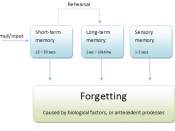The evidence that a person is able to give, to both investigators of a crime, and in a courtroom is one of the most important aspects of proving an offence has occurred. It is little wonder then that it is of the utmost importance that this evidence is both the truth and an accurate recollection of the events that surround the issue. When dealing with children as witnesses, it is imperative to acknowledge that suggestibility is of much concern when obtaining this evidence. This paper will outline the memory processes and detail a number of factors that influence suggestibility. It will also explain the PEACE model of interviewing along with the cognitive interview, and show how these can reduce suggestibility with child witnesses to obtain the best possible recall of the events at hand.
According to Gray (1999) "Memory can be defined as an individual's entire mental store of information and the set of processes that allow the individual to recall and use that information when needed."
(Gray. 1999.) Within this mental store, there are two very different sections, or types of memory. These are short and long term memory. Short-term memory is often referred to as the working memory, and is constantly being used. The short-term memory is like a computer disk in that once the disk is full, new information is 'written over' the old information. "As implied by the label "Short-term," information is lost quickly from this store, within seconds, once it is no longer actively rehearsed or thought about." (Gray. 1999.) Information that is in our short-term memory has the ability to be stored in our long-term memory, however, for this to occur, this information must be both rehearsed and encoded. "A relatively small proportion of the material that enters the short-term memory is...


